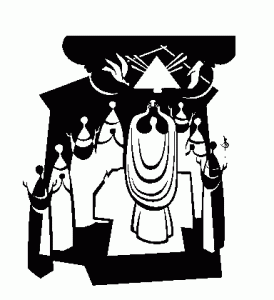1 Kings 3: 3-12; Hebrews 12:1, 2; 12, 13
” Sermon for All Saints Day”
My grandmother, after whom I am named, passed away in 2000 at age 95 in Mechanicsburg, Pennsylvania. She was one of a kind, like all the people we honor today. Cook Extraordinaire. Enemy of all moles- because of the damage they did to her acre garden. Impatient with a certain granddaughter who climbed the apple tree to avoid chores and read a book. Possessed of a stubborn cheerfulness that stayed with her to the very end of life. That’s all I have time to tell you. Today. I wish you had known her. I wish I had known more of those we honor today. Because what God says is true of Solomon is true of them: No one like them has ever been before and no one like them will ever arise again.
A few days after her funeral service, I went with my mother to Nana’s apartment at Bethany Village United Methodist retirement village where she had lived for the past 20 years. Mom didn’t want to go through her things alone. I’m known in the family for my efficiency in giving things away in the interest of neatness. I’ve even thought at times that, if this professor thing doesn’t work out, I could start a business where you go in and help people declutter and organize their lives. So I was an ideal choice to go with Mom to Nana’s apartment.
The apartment was still the same as I remembered it from many visits. Nana had surrounded herself with mementos of her family, and so I stood in the middle of her little living room surrounded by pictures of my mom, her only child, her four grandchildren and 7 great grandchildren. Surrounded by special china and figurines all of which I remembered from visiting her as a child.
As I stood looking around the room, a troubling vision came to my mind: I pictured what would happen in a couple of days to this room; – the carpet cleaners would come in and steam clean the carpets. The painters would come in and repaint the walls. And then someone else would move into Nana’s space. My mind filled with dread and my limbs were weighed down with weariness. None of us wants our loved ones to be forgotten! We want the flag to stay at half mast. We don’t want anyone to delete the bulk email that announces a death in the SMU community. We want to live surrounded by their memory.
I’m afraid I wasn’t as much help to my mom that day as she had hoped. Because the de-clutter queen spent most of the morning squirreling things away in a big boxed marked keep. Two green bird figurines I remembered seeing in her living room in her bigger house as a little girl. The blue porcelain tea set we’d had tea out of so many times with the cups with missing handles. And the pink art deco vases with the figures of nubile young women on them-that my grandfather had splurged and bought for her in 1935 because she had admired them in the department store display. My kids call them the naked pink ladies vases and ask me to put them away when we have company. But I don’t. I taped up the box and shipped it to TX from Pennsylvania – so that those who live in and visit my home will be surrounded by memories of Nana.
When I got home from Pennsylvania, I found a stack of cards waiting for me my friends and relatives. I appreciated the thoughtfulness of the senders. I put the cards on the table in our front hall in an orderly row. Most of the cards had pictures of trees or flowers and sometimes boats on the front and inside something like “May your pain be lessened by the hope that your loved one will live on in the memories of those whose lives she touched.” That’s our culture’s definition of life after death. And it is a theme that threads its way through many world religions. It has always seemed to me to have a sort of wishful thinking feel to it.
I wanted bolder cards. I wanted cards that expressed faith facts from my scriptural, theological tradition, not human hopes from culture.
I even imagined the insides to the cards I wanted to receive and put around my house.
How about a card with a picture of King Solomon on the front and inside and a quote from 1 Kings 3 This is the account of Solomon’s request of God when he was mourning his father and feeling inadequate to be king. The people wrote it down so they could, remember it in times of national bereavement and confusion.
How about a card with God’s response to Solomon affirming his uniqueness?
No one like your loved one has ever been before and no one like your loved one will ever be again. Thanks be to God in whose loving care she rests now and always!
Your loved one now joins the company of the faithful who, in good times and trials, turned to God and found God faithful. In the same way you live, surrounded by the presence and power of God who can bring joy even in unspeakable grief.
*************************************************************
How about this from the 12th Chapter of the Letter to the Hebrews? Written to a church with faith fatigue whose author wanted them to remember past people of faith to energize them for struggles that lay ahead?
Since we are surrounded by so great a cloud of witnesses, then let us lay aside every weight and the sin that clings so closely and run with perseverance the race that is set before us.
***********************************************************
How about this that would express the spirit of the Kaddish mourning prayer we will soon say together?
To praise God in times of joy is easy. To praise God in times of sorrow is much harder. God has an ultimate plan for the world, that every individual has a unique role to play in that plan, and that the plan is good.
Soon we will say the Kaddish, a prayer synonymous with Jewish mourning. How interesting that
Soon we will say the Kaddish, a prayer synonymous with Jewish mourning. How interesting that this prayer intended for the mourners does not mention death or consolation. It does not speak of loss, sadness, or bereavement. The literal meaning of Kaddish is “holy” and the prayer is a doxology listing God’s holy attributes: Blessed, praised, honored, extolled glorified, adored and exalted.
These are hard words for mourners. It is hard to praise the God who permitted the death of a loved one. Yet for centuries Jewish tradition has placed this prayer in the mouths of people with no taste for praise. Its purpose is to turn our thoughts from death and loss to focus on the attributes of God. For God created the world and human beings and called it all good. And death is a part of life. Says Psalm 89:848 “Who can live and never see death?” Since we believe that God is for us, even death, with its dread and pain, must be intended for our good.
Judaism is a faith that embraces all of life, and death is a part of life. This faith leads us through moments of joy and guides us through terrible moments of grief, holding us firm through the complex emotions of mourning and bidding us turn our gaze from the night of darkness to the dawn of life.
The Kaddish intends that mourners turn away from death and choose life. It intends that we take notice of our surroundings- the love of God that guides and preserves our innermost being in this life and the next.
I once attended a funeral and the Protestant Christian pastor began it by smiling broadly at the congregation and exclaiming, “Dry your eyes! We have not come to mourn but to celebrate!” He was half right. When Christians hold a funeral or memorial service, they acknowledge their human grief, but affirm their loved one’s eternal life through the gift of the death and resurrection and ongoing life of Jesus Christ. So Paul reminds the Church of the Hebrews and contemporary Christians to look to Jesus, our example and, through God’s grace, our strength, as we press ahead in the challenging race of life.
Common to both faiths is the injunction to remember as a means of accessing the spiritual power and joy with which God surrounds us.
Remember persons of faith. We gather today to remember and to honor and to
give thanks and to be encouraged by the example of those who have gone on to the next phase of life in this past year. In the eyes of this community and God, they are not forgotten and they will not be forgotten! Their memory surrounds us and inspires us to surround one another with the care and compassion that God intends for human communities.
I forgot to mention earlier that I am named after my grandmother. She was the original Alyce. While she was living they called her Alyce senior and I was Alyce junior. Jewish tradition says that, in addition to saying Kaddish for a departed loved one, another way to remember them is by naming a child after them. The tradition affirms that a spark of that person will live on in the child and that the child will actually embody some of the special qualities of that person.
One of the things I found while helping my mom go through Nana’s things was a box on the top shelf of her hall closet, a box with all her id badges in it. There was her library helper’s badge she wore when helping in the Bethany Village library each Friday afternoon. There was her medical card with her picture on it. There was her driver’s license, which she had let expire at age 89 but still kept. All these picture identifications. I felt a wave of sadness because she wouldn’t need them anymore. Then I felt a wave of joy because she wouldn’t need them anymore.
It was as if God were saying to me, “No one like her has ever been before. And no one like her will ever be again. I value her. I embrace her. Honor her memory by living by the best example she set during her earthly days. Give thanks, and be at peace.”
(This sermon was originally preached on All Saints Day, 2005 at Southern Methodist University’s Service of Remembrance)












